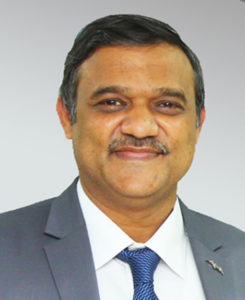Catching up with past NDSA Excellence Awards Winners: Dr. Dinesh Katre!
The NDSA Individual Excellence Award honors individuals making significant contributions to the digital preservation community. In 2019, Dr. Dinesh Katre was one of two awardees in this category. Dr. Katre was recognized for his work to advocate for and deploy the Indian National Digital Preservation Programme which provides a robust and comprehensive platform for the effective long-term preservation of digital materials. As Chief Investigator of the Programme’s flagship project to establish a Center of Excellence for Digital Preservation,

Dr. Katre led the process to develop a digital preservation standard for India. He also conceptualized, designed and led the development of DIGITĀLAYA, a software framework, which comprehensively implements the OAIS reference model. Katre’s efforts culminated in the first repository in the world to achieve ISO 16363 certification.
We recently caught up with Dr. Katre to learn more about the progress of his work on the Indian National Digital Preservation program and other projects over the last few years.
1) What have you been doing since receiving an NDSA Excellence Award?
I have spearheaded the working group constituted by Supreme Court of India, which has defined the Digital Preservation Standard Operating Procedure (SOP) for the Indian Judiciary which provides coverage for Supreme Court of India, 25 High Courts and 672 District Courts. The SOP provides guidelines and recommendations with regard to Information Governance (IG) policies for courts, digitization of judicial records, cloud infrastructure for establishing Judicial Digital Repositories, tools and technologies, standards, AI/ML based applications to leverage upon massive data repositories to modernize the Indian Judiciary for accelerating the justice delivery. Most interestingly, we conducted 5 rounds of surveys across all high courts and district courts to collect information on various aspects of digitization. Huge amount of data was collected and analyzed for developing the insights. I am pleased to inform that the Digital Preservation Standard Operating Procedure (SOP) has been approved by honorable Chief Justice of India and sanctioned by the Law Ministry for implementation across the judiciary. The SOP is available at the following URL: https://ecommitteesci.gov.in/document/digital-preservation/
2) What did receiving the NDSA award mean to you?
I have worked extensively towards establishing the Indian National Digital Preservation Program since 2008, which involved development of archival systems, tools, standards, and digital repositories to comply as per the ISO 16363. As a part of my research, I had organized an Indo-US workshop to study the international trends in digital preservation in collaboration with the experts from National Digital Information Infrastructure and Preservation Program (NDIIPP) of the Library of Congress. I knew that National Digital Stewardship Alliance (NDSA) was originally launched by NDIIPP in 2010. Therefore, it was an immensely inspiring and encouraging moment for me to receive the NDSA Individual Innovation Award in 2019.
3) What efforts/advances of the last few years have you been impressed with or admired in the field of data stewardship and/or digital preservation?
I am particularly impressed with the advances in Digital Humanities and Computational Archival Science (CAS) which leverage upon artificial Intelligence/machine learning technologies to enable automation of digital preservation procedures and knowledge extraction from the digital repositories.
4) How has your work evolved since you won the Excellence Award?
The NDSA award infused me with a great deal of confidence and courage to embrace the evolving technological landscape. Since then, I have initiated R & D on the development of intelligent archiving tools for automatic metadata extraction, ontology-based classification of records, document orientation detection, visual entity tagging in miniature paintings and information extraction from documents.
5) What do you currently see as some of the biggest challenges or opportunities in digital preservation?
Whether proprietary or open source, the major challenge is heterogeneity and inconsistency in the properties of file formats. The digital preservation domain has been relying on open-source file formats but we must understand that they are primarily evolved for the purpose of interoperability. Therefore, a wider consensus is required for defining comprehensive “Universally Intelligible & Interoperable File Formats (UNIIFormats, a term coined by me) for all major types of contents, which would be specially designed for the purpose of digital preservation. The proposed UNIIFormats should provide built-in support for self-description, knowledge markup, semantic linkability, searchability, accessibility, discoverability, authenticity, and backward & forward compatibility. One should have a choice of storing information in the proposed UNIIFormat, if it requires long term retention. Incorporating so many properties into a file format may sound a bit utopian but I feel that there has not been much evolution and advancement in the file formats as compared with other technological advancements.
Presently, producing these properties for the data requires you to avail separate, fragmented, and paid application services. It may be beneficial for business but detrimental for preserving the digital footprint of the human civilization. Post-processing of the data for preservation is very laborious, costly, prone to loss of information, errors, and mis-interpretation.
We also require to use AI ML techniques for creating knowledge services to leverage the massive data repositories, which can help in long term sustenance.
You may like to refer my presentation on “Digital Eternity: Innovating a Future for the Past” which is available at the following URL: https://www.youtube.com/watch?v=lpr4ypE88qI&t=3047s
6) Are you working on any new digital preservation related projects at the moment?
I am presently leading the Digital Preservation for the Indian Judiciary initiative and Digital Preservation of Sanskrit Encyclopedic Dictionary project which is supported under the Science & Heritage Research Initiative (SHRI) of the Department of Science and Technology (DST).
The post Catching up with past NDSA Excellence Awards Winners: Dr. Dinesh Katre! appeared first on DLF.
